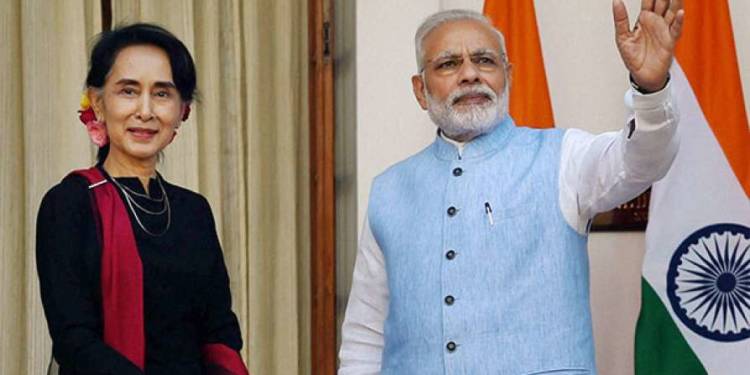
New Delhi. In a major development, Myanmar has decided to expedite India-backed infrastructure projects and widen security ties with India and counter China’s expanding presence in the country in the backdrop of Beijing’s active cross-border support for rebel groups and push for early completion of BRI projects.
Myanmar’s all-powerful generals, who have controlled the country for decades, are upset with the Chinese strategy of arming rebel groups including Islamic radicals. They are also disturbed with China’s pressure on Myanmar to implement Belt-Road-Initiative (BRI) projects in spite of the ongoing Covid-19 pandemic.
China is planning a China-Myanmar-Economic Corridor (CMEC), on the lines of China-Pakistan Economic Corridor (CPEC), to get access to the Bay of Bengal and the eastern part of the Indian Ocean Region (IOR). Several other BRI related projects threaten to push Myanmar to a debt trap.
Speaking to journalists in Russia last month on the occasion of Victory Day parade, commander-in-chief of Myanmar armed forces Senior General Min Aung Hlaing called for international cooperation in the fight against terrorism, saying that terrorist groups exist because of “strong forces”.
According to analysts, Gen Hlaing’s comment was targeted at China, which the Myanmar military (or Tatmadaw) suspects is continuing to provide arms to rebel groups on the Myanmar-China border and to the Arakan Army (AA), which is now operating in northern Rakhine state as well as the radical Arakan Rohingya Salvation Army.
While China has offered to play the role of peace broker in Myanmar’s ongoing ethnic conflicts, senior Tatmadaw leaders claim that China is not to be trusted. They suspect China of supporting some ethnic insurgent groups in Myanmar while at the same time meddling in the peace process, according to a report in ‘The Irrawaddy’, an independent media group covering Myanmar and Southeast Asia.
While in Moscow, Gen Hlaing met Defence Minister Rajnath Singh and explored Myanmar-India defence cooperation. The two also discussed security cooperation to ensure successful implementation of the India-funded Kaladan Multimodal Transit Transport Project across the Mizoram border.
The project aims to open sea routes and a highway transport system linking the eastern Indian seaport of Kolkata with the country’s landlocked northeastern state of Mizoram through Myanmar’s Rakhine and Chin states. China-backed AA rebels are allegedly targeting the men working on the Kaladan project. The Sittwe Port, also made by India, as part of the project is ready for operation.
In May, the Myanmar government handed 22 rebels from the northeastern states over to the Indian government. The rebels belonged to groups that have bases along the border in Myanmar’s Sagaing region.
Myanmar received its first submarine from India last year, a Russian-made Kilo-class diesel-electric attack submarine and India continues to provide technical support for the vessel, according to a Myanmar military spokesman. New Delhi has also agreed to train Myanmar army officers and allow them to study at military academies in India.
Last year, security forces of India and Myanmar cooperated to clamp down on the northeastern insurgent groups, with Myanmar troops driving insurgents hailing from Nagaland and other states out of their main base in Taga in Sagaing region.








